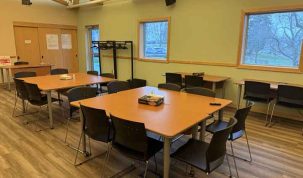‘Family Literacy Day’ Highlights Value of Talking, Reading and Playing with Children to Encourage Literacy Skills –
In less time than it takes to watch a TV sitcom, reading with your child for 20 minutes each day can lead to benefits that last a lifetime.
The Haliburton, Kawartha, Pine Ridge District Health Unit is offering these encouraging words to local families in the lead up to Family Literacy Day on January 27. The awareness day highlights the benefits for parents and caregivers to read, talk, listen, and play with children for 20 minutes each day to help develop strong literacy skills for life. The Family Literacy Day website (www.familyliteracyday.ca) makes it easy to do this with resources, tips and fun activities.
“As parents, we all appreciate those moments when we can turn off our electronics and plug into quality time with our children by sharing a book, story or joke,” says Shelley Shaughnessy, a Public Health Nurse with the HKPR District Health Unit. “It’s time well-spent, and the research backs this up in a big way.”
ABC Life Literacy Canada is the organization that promotes Family Literacy Day. According to ABC, children whose parents spend time reading and encouraging literacy score better on standardized reading tests. More importantly, says Shaughnessy, children can enjoy improved speech skills that can help them in an ever-changing world.
Shaughnessy understands that tight schedules or a child’s lack of interest can make it difficult for parents to read or do literacy activities for 20 minutes each day. “While that is a reality,” she notes, “there are creative ways to engage and support your child’s literacy skills, even if it doesn’t involve picking up a book.”
For example, Shaughnessy offers some fun ways to encourage literacy skills that won’t feel like learning to children. They include: • Playing a board game together or telling knock-knock jokes while doing the dishes. • Organizing a ‘grocery hunt’ in which children search the store for food items on the family grocery list. • Playing ‘home restaurant’ by getting children to create a menu for a meal by drawing food items or using grocery store flyers. To spice up mealtime, children can even take food orders too. • Getting children to read different traffic signs along the roadway when travelling out-of-town. • Visiting the local library and getting your child a library card. This can increase independence and inspire a child to borrow and read books that are of personal interest.
“Engaging a child for 20 minutes each day to support literacy skills is worth every minute, especially given the rewards for you and your child,” Shaughnessy adds. For additional resources, including speech and language milestones and links to local service providers, visit the KidTalk website (www.kidtalk.on.ca).

























